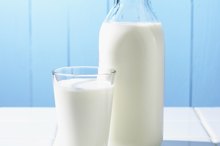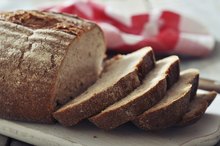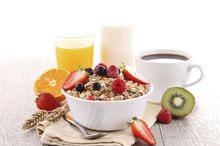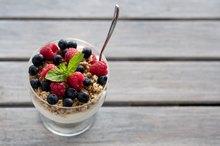The Calories in a One-Egg Omelet
Cooks make omelets by beating together eggs, milk or water, and seasonings, pan frying the mixture in butter until it obtains a light, fluffy consistency. Either sweet or savory ingredients can be added. Whole-egg omelets are a significant source of calories, fat and cholesterol.
If you are experiencing serious medical symptoms, seek emergency treatment immediately.
Calorie Breakdown
A plain omelet made with one large egg contains approximately 94 calories, 7g of fat, 6 g of protein, 2 g of saturated fat, 0.4 g of carbohydrate, 191 mg of cholesterol and 95 mg of sodium, according to USDA calculations. Fat accounts for roughly 68 percent of the calories, protein for 27 percent and carbohydrate for 5 percent.
Considerations
Calories & Sugar in Skim Milk
Learn More
A one-egg plain omelet offers 29 percent of the selenium, 19 percent of the vitamin B-12, 18 percent of the riboflavin, 16 percent of the pantothenic acid, 15 percent of the phosphorus and 12 percent of the vitamin A that the Institute of Medicine recommends adults consume daily. It also has 64 percent of the cholesterol, 14 percent of the saturated fat and 9 percent of the total fat that MayoClinic.com advises adults to limit themselves to per day.
Serving Suggestions
You can reduce an omelet's cholesterol content by using only egg whites instead of whole eggs and cooking the mixture in olive oil instead of butter. Add diced vegetables to omelets to increase your vitamin and mineral consumption.
Related Articles
Resources
Writer Bio
Christine Gray began writing professionally in 1997, when a trade publishing company hired her as an assistant editor. She wrote her first screenplay in 1998 and has been covering health and nutrition since 2009. Gray graduated with a Bachelor of Arts in English literature from the University of Michigan.









